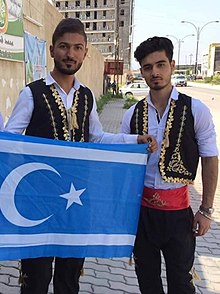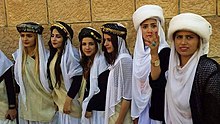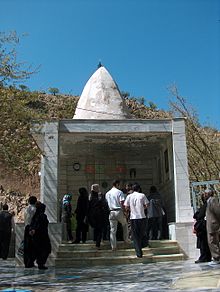Minorities in Iraq
The minorities in Iraq are made up of many ethnic and religious minorities. Under the Iraqi constitution , all minorities living there have legal rights . Much of it lives in the disputed areas of northern Iraq .
According to Article 125 of the Iraqi Constitution:
“This constitution guarantees the administrative, political, cultural and basic educational rights of the various nationalities, such as the Turkmen, Chaldeans and Assyrians, and all other components [= nationalities]; this is regulated by law. "
According to the Bavarian State Chancellery , based on a judgment of the Bavarian Administrative Court of Bayreuth , based on information from the German Orient Institute :
“The state registration of religious or ethnic groups mostly only deals with the naming of the largest groups and subsumes smaller groups under“ others ”. So far, for example, Iraqi ID cards belonging to the group “Arabic” have been used. “Kurdish”, “Turkmen”, “Chaldean”, “Assyrian” or “Syrian” or “other”. In 2016, however, the entries were changed to “Arabic”. "Kurdish" and "Turkmenian" limited. "
Assyrians
The Assyrians consider themselves the descendants of the ancient Assyrians and as an indigenous people of Mesopotamia and belong to oriental Christianity .
Turkmen
The Iraqi Turkmens speak a Turkic language and refer to their settlement areas in Iraq as Turkmeneli .
Armenians
Many Armenians have found refuge in what is now Iraq as refugees due to the Armenian genocide . Some of them also date from the 17th century. They all belong to a Christian church and speak Armenian or Kurdish (in northern Iraq) as their mother tongue.
Yazidis
The Yazidis are a religious minority in Iraq and see themselves partly as ethnic Kurds , partly as an independent, separate ethnic group . According to a report by the United Nations High Commissioner for Refugees , it is controversial within the Yazidis and also within the Kurds whether the Yazidis are ethnic Kurds or a separate ethnic group in their own right. Most of the Yazidis speak Kurmanji as their mother tongue. Only in the two villages of Baschiqa and Bahzani do the Yazidis speak Arabic as their mother tongue.
Shabak
The Shabak are a religious minority and are mostly viewed as Kurds. Shabak are generally multilingual, they speak Gorani , Arabic and Turkish . Native Shabak is the Schabaki . In the British Mandate of Mesopotamia , the Shabak were recognized as an independent ethnic group in Iraq until 1952. They were later registered as Arabs under Saddam Hussein's rule. They are not named in the new Iraqi constitution. According to a report by the human rights organization Human Rights Watch , they are being forced into a Kurdish identity by the Kurdish authorities. During the 1987 census in Iraq, the Shabaks were faced with a choice of ethnic registration: Kurds or Arabs. They were unable to identify as a separate nation. According to Michiel Leezenberg, the Shabak are made up of different tribes and have Kurdish, Arab and Turkmen origins. According to information from the Foreign Office, there is no official documentation of the Schabak's membership.
Mandaeans
The Mandaeans are a religious minority in southern Iraq and speak the official language Arabic . They use the Mandaean language as the sacred language .
Lurs
The Iraqi Lurs are an Iranian people and speak the Luric language . Faili-Lurs, also known as "Faili-Kurds", are an Iranian or Kurdish tribe and call their language Faili .
Ahl-e Haqq
The Ahl-e Haqq, also known as Kaka'i or Yarsan, are a religious minority with Kurdish , Lurian , Persian , Arab and Azerbaijani followers.
Individual evidence
- ↑ Sean Kane: Iraqs disputed territories. In: PeaceWorks. United States Institute of Peace , 2011, accessed October 15, 2018 .
- ↑ a b Christians and Yazidis in Iraq: Current Situation and Perspectives. In: Konrad Adenauer Foundation. P. 32 , accessed on October 15, 2018 (in accordance with Article 125 of the Iraqi Constitution): “This constitution guarantees the administrative, political, cultural and basic educational rights of the various nationalities, such as the Turkmen, Chaldeans and Assyrians, and all other components [= Nationalities]; this is regulated by law. "
- ↑ a b On Vulnerable Ground. In: Human Rights Watch . November 2009, accessed October 15, 2018 .
- ↑ The situation of Yazidi seekers of protection. German Bundestag, p. 9 , accessed on October 15, 2018 .
- ^ Foreign Office: Foreign Office - Iraq . In: Foreign Office DE . ( Auswaertiges-amt.de [accessed on October 15, 2018]).
- ↑ Iraqi Constitution of 2005. In: Constitute Project. Iraqi Constitution 2005 , 2005, p. 37 , accessed October 16, 2018 .
- ↑ a b VG Bayreuth, judgment v. 07.03.2017 - B 3 K 16.31008 - Citizen Service. Retrieved October 22, 2018 .
- ↑ Hans-Joachim Löwer: With fire and sword: How Christians are persecuted today in the Middle East . Styriabooks, 2016, ISBN 978-3-99040-422-5 ( google.de [accessed October 16, 2018]).
- ↑ UNHCR's ELIGIBILITY GUIDELINES FOR ASSESSING THE INTERNATIONAL PROTECTION NEEDS OF IRAQI ASYLUM-SEEKERS. United Nations High Commissioner for Refugees , August 2007, accessed October 16, 2018 .
- ^ Joshua Castellino, Kathleen A. Cavanaugh: Minority Rights in the Middle East . OUP Oxford, 2013, ISBN 978-0-19-166887-6 ( google.de [accessed October 16, 2018]).
- ^ Samuel Totten, William S. Parsons: Century of Genocide: Critical Essays and Eyewitness Accounts . Routledge, 2004, ISBN 978-1-135-94558-9 ( google.de [accessed October 16, 2018]).
- ↑ a b Dave van Zoonen, Khogir Wirya: The Shabaks - Perceptions of Reconciliation and Conflict. Middle East Research Institute, August 2017, accessed October 16, 2018 .
- ↑ Maarten Michiel Leezenberg: The Shabak and the Kakais: Dynamics of ethnicity in Iraqi Kurdistan . University of Amsterdam, 1994 ( google.de [accessed October 17, 2018]).






